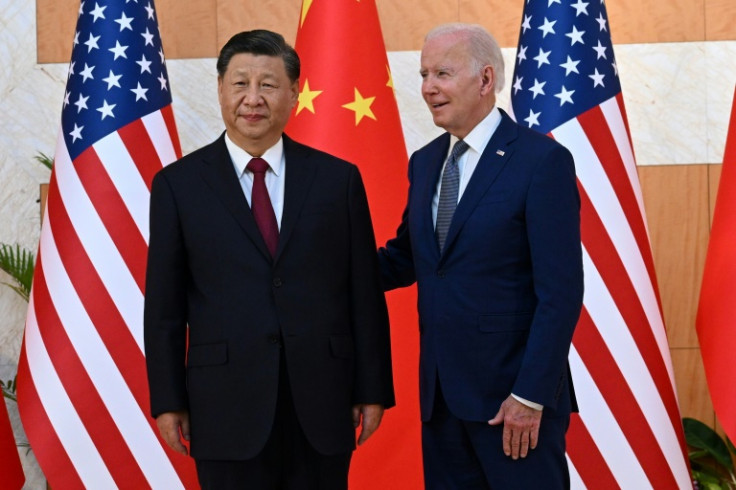US-China Relations At A Turning Point As Economic War Hurts Both Countries

The U.S.-China relations are about to turn the corner, as both countries suffer the consequences of the trade war. The U.S. can get better terms of trade if things return to normal.
That's according to Dr. Tenpao Lee, professor emeritus of economics at Niagara University.
"China's economy is in deep trouble with a very high unemployment rate, deflation and devalued RMB in contrast to the significant inflation in the USA," Lee told International Business Times.
"The USA is still the strongest country in the world, and we can get better trade terms with China if we decide to resume our relationship with Beijing to the pre-pandemic levels," he elaborated. "The USD is strong, and everything from China or other countries would be cheaper to help lower our inflation levels."
Lee's comment follows a meeting last week between President Joe Biden and China's foreign minister, Wang Yi, in the presence of Secretary of State Antony Blinken and national security advisor Jake Sullivan.
The high-profile meeting occurred during a three-day visit to Washington by the Chinese foreign minister. The two sides agreed to work toward a meeting between President Xi Jinping and Biden. It could happen on the sidelines of the upcoming Asia-Pacific Economic Cooperation in San Francisco in November.
Still, China's foreign minister sees much work before this meeting becomes a reality. "The path to San Francisco won't be an easy one, no self-driving to it," he said.
Aédán Mordecai, lead Asia-Pacific analyst at Sibylline, sees an effort by both Beijing and Washington to stabilize relations. "Several high-level meetings between Chinese and American officials in the past month indicate a desire from both sides to stabilize relations and establish more channels for communication following a sustained period of significant tensions," he told IBT.
Mordecai believes these efforts seek to avoid an unnecessary and costly escalation that could otherwise arise from miscommunication amid heightened tensions. "Efforts will also likely revolve around relatively less sensitive topics that both sides could potentially co-operate on, such as climate change or efforts to counter transnational organized crime," he said.
Lee believes that the two sides must be open-minded about the state of the global economy and the role of new technologies in fostering growth. "We may enter the second phase of the global economy to make all countries better economically," he said. "As to the chip war, we must realize that technology keeps moving forward with newer developments. We considered railroad construction as an advanced technology, car manufacturing, computers, GPS, AI, EV, autonomous driving."
Moreover, he believes the U.S. needs to continue its technological advance through R&D and assert leadership in the global supply chain rather than pursue sanctions against the market-oriented economy it created. "China is a potential competitor to make us better," Lee argued. "China is not a threat to us in the foreseeable future as China's RMB is not stable with restrictions to flow internationally. "
But Irina Tsukerman, geopolitical analyst and president of Scarab Rising, sees these high-level meetings signaling a cosmetic change in relations rather than a significant step toward addressing substantive issues.
Meanwhile, she argues that China has not stopped any of its belligerent activities against the U.S. "Aggressive espionage and intellectual property theft continues, as well as assorted forms of anti-American incitement in China's propaganda outlets and punitive and harassing laws against foreign companies," she said.
She believes Beijing is looking to take advantage of any foreign policy opening. "It has significant investments in California and will continue to pursue financial and economic opportunities wherever it can, including with its adversaries — while advancing its geopolitical interests in every other way," she elaborated.
"It is incredibly naive to expect Beijing to give up its global ambitions, which are going fairly well despite internal economic issues, just to placate the U.S. or for the sake of a few meetings," Tsukerman concluded.
Mordecai is skeptical about the outcome of these high-profile meetings for more sensitive issues, too. "While both sides desire to stabilize relations, significant points of contention will likely prove too large of an obstacle to materially improving ties sustainably," he elaborated. "These include disputes over the South China Sea — where Biden has recently reaffirmed Washington's commitment to defending the Philippines in case of any attack on their vessels, aircraft or armed forces."
Paul Kutasovic, professor at the New York Institute of Technology, is on the same side. "The politics aren't right in Washington to help ease the tensions between the two countries," he told IBT.
Still, Lee sees these meetings as an effort by the two parties to return to normalcy. "To resume a normal relationship with China will be a win-win situation, and we are in a better position to negotiate as China's internal issues are challengeable," he added.
© Copyright IBTimes 2025. All rights reserved.






















